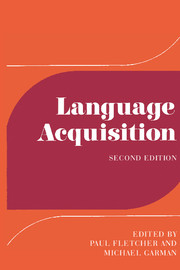Book contents
- Frontmatter
- Contents
- Contributors
- Preface
- Part I Contexts and determinants
- Introduction
- 1 Psychosocial aspects of language acquisition
- 2 Language acquisition and cognition
- 3 Language acquisition and linguistic theory
- 4 Conversations with children
- 5 Learnability
- 6 Variation in child language
- Part II The development of linguistic systems: phonology
- Part III The development of linguistic systems: grammar
- Part IV Later language development
- Notes to chapters
- Bibliography and citation index
- General index
- Titles in the series
Introduction
Published online by Cambridge University Press: 05 June 2012
- Frontmatter
- Contents
- Contributors
- Preface
- Part I Contexts and determinants
- Introduction
- 1 Psychosocial aspects of language acquisition
- 2 Language acquisition and cognition
- 3 Language acquisition and linguistic theory
- 4 Conversations with children
- 5 Learnability
- 6 Variation in child language
- Part II The development of linguistic systems: phonology
- Part III The development of linguistic systems: grammar
- Part IV Later language development
- Notes to chapters
- Bibliography and citation index
- General index
- Titles in the series
Summary
The day when a monolithic explanatory theory of language acquisition could be elaborated and discussed in a section such as this is still a long way off. Nevertheless it is important to try to consider language learning as a whole in Part I, to set the scene for what comes later. Parts II and III of the book address important aspects of the development of phonology, morphology and syntax in English and, to a limited extent, in other languages. Part IV addresses changes in spoken language and its basis after 5 years of age, and the beginnings of literacy skills. It is appropriate, then, that we lay out here a number of different views of how explanation in language development might be approached, and how independent variables relevant to the learning of language might be delimited, and their effects examined. We have maintained here the part title of the first edition – ‘Contexts and determinants’ – which we interpreted there as the ‘external’ and ‘internal’ settings for language development. Three of the chapters from that part in the first edition appear here in a revised form: Snow on ‘Conversations with children’, Campbell on ‘Language acquisition and cognition’ and Wells on ‘Variation in child language’. Part I of this edition also includes three new chapters: Hickmann gives a Vygotskian perspective on language development in ‘Psychosocial aspects of language acquisition’ and that is followed by two chapters concerned with the relationship between linguistic theory and language acquisition: Goodluck on ‘Developing grammars’ and Atkinson on ‘Learnability’.
- Type
- Chapter
- Information
- Language AcquisitionStudies in First Language Development, pp. 3 - 8Publisher: Cambridge University PressPrint publication year: 1986



